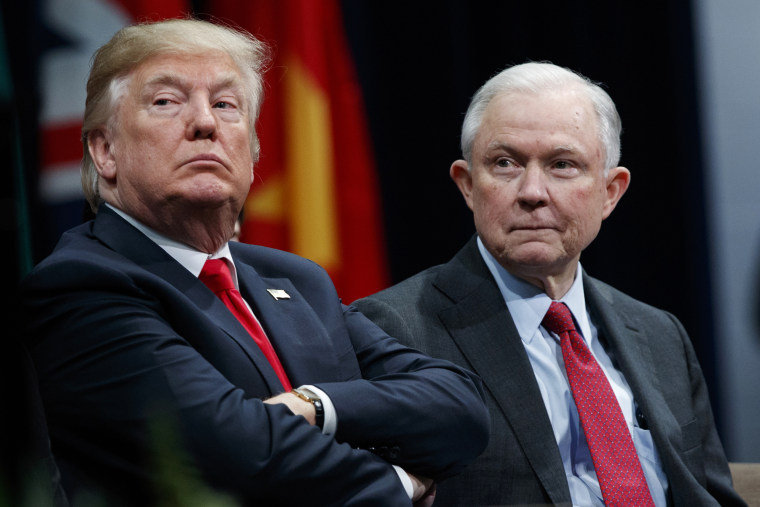There's never been any great mystery behind Donald Trump's seething contempt for Jeff Sessions. As regular readers know, the president expected Sessions to be a partisan loyalist in the attorney general's office, making Trump's legal troubles go away whenever the president snapped his fingers.
Instead, Sessions recused himself from the investigation into the Russia scandal -- a move Trump saw as an unforgivable betrayal, since he believed it was Sessions' job to interfere with the process on the president's behalf.
Despite the occasionally brutal attacks, the Alabama Republican launched an electoral comeback bid in the fall, hoping to reclaim his old U.S. Senate seat. At the time, Trump has sent word that he planned to renew his offensive: the New York Times reported that the president has said that he's "very much still opposed to Mr. Sessions and would make that clear if he had to."
And then ... nothing. Trump was uncharacteristically quiet about Sessions' candidacy for months, hardly mentioning the former A.G. at all. But after the Alabaman struggled in a GOP primary this week, the president's silence ended with an unrestrained tweet. Pointing to news that Sessions has been forced into a runoff against a first-time candidate, Trump wrote:
"This is what happens to someone who loyally gets appointed Attorney General of the United States & then doesn't have the wisdom or courage to stare down & end the phony Russia Witch Hunt. Recuses himself on FIRST DAY in office, and the Mueller Scam begins!"
As a political matter, the missive sent a signal that Trump's private opposition to Sessions' Senate bid has become quite public. As a factual matter, the tweet wasn't even true: Sessions recused himself from the Russia scandal after a few weeks at the Justice Department, not his "first day."
But those weren't the only relevant angles. The Washington Post's Amber Phillips noted yesterday, "Trump is now publicly acknowledging something he spent years not quite saying: that he fired Sessions specifically because Sessions didn't stop the inquiry by special counsel Robert S. Mueller III. The implication is that Sessions wasn't loyal to Trump and what Trump wanted to happen in the Justice Department."
Vox's Aaron Rupar added, "Here's the thing: The president isn't supposed to direct the attorney general to end specific investigations, especially ones directly involving his campaign."
Why does any of this matter? Aside from serving as an example of how reckless Trump's tweeting continues to be -- and as an illustration that his long-simmering, one-sided feud with Sessions isn't over -- it's also worth remembering that while Mueller concluded Trump couldn't be charged with obstruction of justice while he's in office, he could still face charges once his presidency ends. Read in that context, Trump's tweet reads uncomfortably like an admission.
It wouldn't be the first.
